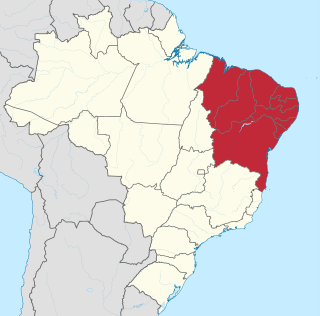
Cashew is the common name of a tropical evergreen tree Anacardium occidentale, in the family Anacardiaceae. It is native to South America and is the source of the cashew nut and the cashew apple, an accessory fruit. The tree can grow as tall as 14 metres, but the dwarf cultivars, growing up to 6 m (20 ft), prove more profitable, with earlier maturity and greater yields. The cashew nut is edible and is eaten on its own as a snack, used in recipes, or processed into cashew cheese or cashew butter. The nut is often simply called a 'cashew'. Cashew can cause allergies triggered by the proteins found in the nuts.

Ceará is one of the 26 states of Brazil, located in the northeastern part of the country, on the Atlantic coast. It is the eighth-largest Brazilian State by population and the 17th by area. It is also one of the main tourist destinations in Brazil. The state capital is the city of Fortaleza, the country's fourth most populous city. The state has 4.3% of the Brazilian population and produces 2.1% of the Brazilian GDP.

Apple cider is the name used in the United States and Canada for an unfiltered, unsweetened, non-alcoholic beverage made from apples. Though typically referred to simply as "cider" in North America, it is not to be confused with the alcoholic beverage known as cider in other places, which is called "hard cider" in the US. Outside of the United States and Canada, it is commonly referred to as cloudy apple juice to distinguish it from clearer, filtered apple juice and hard cider.

The Northeast Region of Brazil is one of the five official and political regions of the country according to the Brazilian Institute of Geography and Statistics. Of Brazil's twenty-six states, it comprises nine: Maranhão, Piauí, Ceará, Rio Grande do Norte, Paraíba, Pernambuco, Alagoas, Sergipe and Bahia, along with the Fernando de Noronha archipelago.
Maximiliano Daniel Biancucchi Cuccittini, is an Argentine former footballer who played as a forward.
Associação Desportiva Recreativa e Cultural Icasa, or simply Icasa, is a Brazilian professional football club based in Juazeiro do Norte, Ceará. It competes in the Campeonato Cearense Série B, the second division of the Ceará state football league.
Barbalha Football Club (F.C.) is a Brazilian football club based in Barbalha in the state of Ceará in the northeast of Brazil.
Nilto Maciel was a Brazilian writer. He wrote poetry and tales in Portuguese, Esperanto, Spanish, Italian and French.
North coast dialect, also called Cearense dialect, is a dialect of Portuguese in the Brazilian state of Ceará, having many internal variations, like in the regions Jaguaribe and Sertões (back-countries).
Flávio José Araújo is a Brazilian football coach, currently in charge of Altos.

Floresta Esporte Clube, simply known as Floresta, is a football (soccer) club from Fortaleza, Ceará, Brazil. Founded in 1954, it currently plays in the Campeonato Cearense and Campeonato Brasileiro série C.
Emília Freitas (1855–1908) was a Brazilian novelist, poet and teacher. She wrote what is considered the first Brazilian fantasy novel, A Rainha do Ignoto, about a utopian society inhabited by women.

Francisco José do Nascimento, known as Dragão do Mar, was an Afro-Brazilian raft fisherman (jangadeiro), pilot and abolitionist figure, who in 1881 led a strike of his fellow jangadeiros in the port of Fortaleza, state of Ceará, refusing to transport enslaved black people to be sold in Rio de Janeiro and other Brazilian provinces.

João Batista do Nascimento Carvalho, known as Valdin, is a Brazilian futsal player who plays as a winger for Esporte Clube URCA JN and the Brazilian national futsal team. Valdin holds the record of the most goals scored in a single international game, when he scored 20 goals in a 76-0 win over Timor-Leste in the 2006 Lusophony Games.
Cléber Bomfim de Jesus, simply known as Cléber, is a Brazilian footballer who plays for Ceará as a forward.

Maria Tomásia Figueira Lima was a Brazilian aristocrat and abolitionist. She was the cofounder of the Sociedade das Senhoras Libertadoras ou Cearenses Libertadoras, a group which was the first of its kind in the country that was formed and led exclusively by women.
Matheus Felipe Santos Nascimento, known as Matheus Felipe, is a Brazilian footballer who plays for Ceará, on loan from Athletico Paranaense as a central defender.









